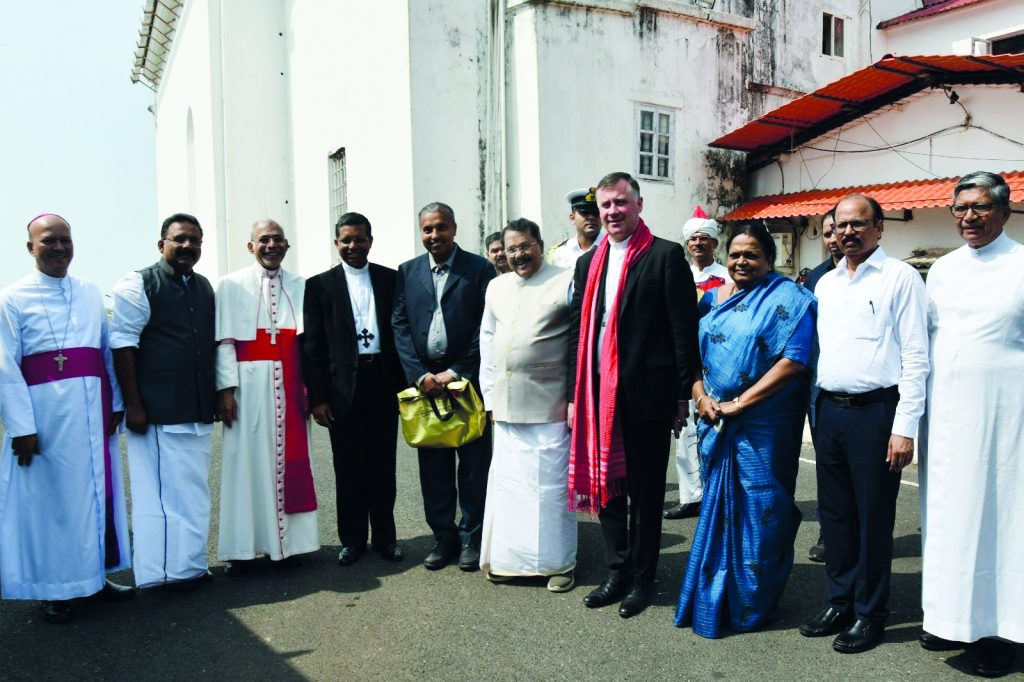SRILANKA BOOM IN TOURISM
IT was exhilarating to be in Sri Lanka last week to attend the wedding of a lawyer friend from Bangalore. And also a great opportunity to visit the Supreme Court, High Court and the District Court all located adjacent to each other in Colombo. Indeed, a learning experience to interact with the Court officials.
Sri Lanka is a beautiful tourist-friendly country having now evolved also as a wedding destination. The streets are free of garbage and the beaches so pristine. Travelling through villages and towns and even sailing through mangroves waters or driving to the upcountry famous for its tea plantations, it was admirable to witness a waste and litter free green country.
Sri Lanka was overflowing with tourists from around the world who are now opting to be there as its value for their money. May be Goa should try and replicate the Sri Lanka model to boost tourism in what was once known as the Paradise of the East.
—Aires Rodrigues, London

RAJ BHAVAN witnessed a momentous occasion as Governor PS Sreedharan Pillai hosted a warm reception for a distinguished nine-member Vatican delegation along with the His Eminence Archbishop George Jacob Koovakad, Cardinal-elect, and a high-level Vatican delegation on November 28, 2024. The visit was initiated by the new cardinal elect Archbishop George Jacob Koovakad.
The Raj Bhavan in Goa has become a stage for a landmark events, observed Governor Sreedharan Pillai, while welcoming the Vatican delegation. The visit led by His Eminence Archbishop George Jacob Koovakad, Cardinal-elect, was enriched by the presence of His Excellency Archbishop Edgar Peña Parra, the third highest-ranking official in the Holy Catholic Church.
Amongst those present on the occasion were Minister for Law Aleixo Sequeira. The delegation included two Cardinal-designates including Archbishop George Jacob Koovakad and His Excellency Msgr Rolandas Makrickas, Archpriest of the Basilica of Saint Mary Major. Cardinal Filipe Neri Ferrão, Archbishop of Goa and Daman, and Most Reverend Simião Purificãcao Fernandes, Auxiliary Bishop of Goa were also present.
While Bishop George Koovakad, Cardinal-Elect expressed his gratitude and wished everyone success, Governor Pillai observed that charity is the truth and serving the people means serving God. God will not forget the work and the love you have shown him as you have helped his people and continue to help them, the Governor added.
The dignitaries were presented with a Holy Cross and copies of the “Bhagavad Gita” as interpreted by luminaries like Mahatma Gandhi, Bal Gangadhar Tilak, Swami Vivekananda, Swami Chinmayanada, Annie Beasant, etc. The presentation of a ceremonial lamp further symbolized the shared light of unity, illuminating the strong bond between India and the Vatican.
The reception was attended by several notable figures, including Rev Msgr Javier Fernández, Chief of Protocol, HE Msgr Flaviano Rami Al-Kabalan, Procurator of the Syrian Catholic Church in Rome, Dr Melania Iermieri, Assistant for Apostolic Journeys, Dr Alessandro Gallo, Assistant for Apostolic Journeys, Dr Daniele Nardis, Assistant for Apostolic Journeys, Mrs Stefania Capuzzo, guest. First Lady of Goa Rita Sreedharan Pillai also graced the occasion. MRM Rao, IAS, Secretary to Governor welcomed the guests while Joemon Job, OSD to the Governor compered and Mazzie D’Sa proposed a vote of thanks.
‘ONE NATION, ONE ELECTION’ HARMFUL!
THE “One Nation, One Election” is harmful to Indian polity, as it will prod regional parties to assimilate into pan-India political outfits, leading to a withering away of heterogeneity in the country’s political space, according to Prof Jagdeep S Chhokar, founder member and trustee of the Association for Democratic Reforms (ADR).
Chhokar, a former director in charge of the Indian Institute of Management (IIM), Ahmedabad with teaching experience spanning universities in Australia, France, Japan and the US, was speaking at the recently held MOG Sundays talk at the Museum of Goa, Pilerne. The ADR was established in 1999 by a group of professors from IIM-Ahmedabad with the objective of improving governance and strengthening democracy in the domain of electoral and political reforms.
During his talk, Chhokar gave insights into the functioning of India’s diverse and complex polity at the state and national levels. India’s level of democratisation is far from satisfactory, he said, adding that the country was fundamentally not a direct democracy but a representative one.
“There is no country in the world that is a perfect democracy. We should look at the degree of democratisation, not if a country is a democracy, and it is lacking in India. A democracy can only exist if the pillars of democracy are democratic in themselves, which none of India’s pillars are,” said Chhokar.
He also mentioned that Section 29A of the Representation of the People Act, 1951, (RP Act) posits that political parties must register themselves through the Election Commission of India (ECI) to obtain legal recognition. Chhokar stated that, however, once registered, a political party exists forever, as the ECI holds no power to deregister them under the RP Act, according to the Supreme Court.
As per the ECI, 2,764 active registered political parties in the country as of March 23, 2024, which are recognised as ‘national’ and ‘State’ parties’. India has six ‘national’, and 75 ‘State’ parties that have been recognised. Goa has three registered state parties, namely, the Maharashtrawadi Gomantak Party (MGP), Goa Forward Party (GFP) and Revolutionary Goans Party (RGP).
Out of these 2,700-plus political parties, less than 300 contest elections. According to Chhokar, registered political parties enjoy legal exemption from income tax payment under Section 13A of the Income Tax Act, which is one of the reasons for their proliferation.
